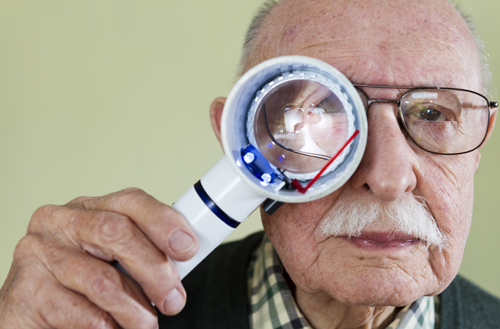“I Can’t See to Cook, What Do I Do Now?”
September 9, 2016

Jack recently had an appointment with his eye doctor. However, at this visit the ophthalmologist informed Jack that there was nothing more he could do for him. Eyeglasses were not going to fix his problem. He needed to give up driving even though he lives twenty minutes from town. “The bus doesn’t run out there,” he thought.
Jack’s wife had passed away last year and he was trying to take care of himself, his home, and his beloved pet cat. He didn’t know what to do or where to turn. Since losing his wife, Jack had been lonely and fewer friends came by to visit. He was having more trouble with shaving, laundry, and even meal preparation. Jack barely knew how to make a sandwich and even that was hard to do now with his failing sight. Jack was also spilling items regularly and life was getting more and more frustrating. He knew he needed help but had no idea where to turn. Fortunately for Jack, a friend did.
Ben had known Jack and Joan for many years, and it saddened him to see Jack struggle with his depression and difficulty maintaining his independence in his own home. Ben had heard of a local support group which met to assist people just like Jack who were going through the same or similar situations. He offered to take Jack to get Jack some independent living skills instruction, so he could once again gain control of his daily life.
The group introduced Jack to others who identified with him and offered suggestions for coping with daily dilemmas. Jack also learned about Blind Field Services within the Department of Rehabilitation. Counselors within this department offer free services in low vision, adaptive daily living skills instruction, orientation and mobility techniques, alternate transportation skills, computer skills, and numerous other resources. Throughout Jack’s time in the group he learned how to be his own advocate.
Jack also learned:
- Take things slow.
- Think first about what needs to be done.
- Organize all required items for the task. A lipped tray sometimes helps as a work area because it captures any spills or small items. For example, when preparing food, the bowl and utensils can be placed on the tray while the ingredients can be lined up in order of use around it.
- Often a large print or talking timer, clock, or other assistive device makes the job easier. It is helpful to measure ingredients and cook at a lower heat to allow for more control over the process.
- Use both hands for a task. This allows one to search for items, put things away, protect the upper and lower body indoors when moving through the home safely and, in general, to be in more control of the environment.
- Find a way to organize and label items in an efficient manner, so that items can be easily found for use when needed. Often tactile labels can be found at hardware and craft stores.
- Breathe. It does get easier with practice. Everyone makes mistakes. The important thing is to not give up.
- Find a support group which will allow you to express your feelings and obtain resources.
Jack survived his course of instruction. With the help of a counselor at CA Department of Rehabilitation, (call 916-558-5300), he received the magnification devices required to assist his vision, the mobility training to help him learn how to navigate the transportation in rural county, and the adaptive daily living skill instruction within his home to get him back safely functioning again.
Jack now prepares meals for himself and has an occasional guest. It does take him longer than it would if he were sighted, but he hasn’t lost any weight and he even enjoys an occasional meal out thanks to his newly found mobility skills. Jack has also learned how to advocate for himself in restaurants and stores, in order to obtain the assistance he requires when out in public.
He continues to attend the support group and offers assistance to others who have found themselves in similar situations.
Terry R Flattley, MA is a Care Manager with Elder Options, Inc. Terry has a wealth of knowledge regarding vision therapy, dementia and Alzheimer’s disease care, and entitlement programs. Terry’s passions for Care Management comes from the joy she receives from others’ willingness to be open and share their circumstances to enable appropriate assistance.

